
Do weight loss drugs increase cancer risk?
What's the story
The rising popularity of weight loss drugs such as Wegovy/Ozempic and Mounjaro has raised concerns over their long-term availability. These medications, known as GLP-1 receptor agonists, are associated with common gastrointestinal side effects like nausea, vomiting, and constipation. More serious issues have also been flagged, including possible links to eye disease, reduced libido, and a potential increased risk of some cancers. However, the evidence for these risks is still limited.
Cancer concerns
Potential thyroid cancer link
The most significant cancer-related concern with these drugs is thyroid cancer. Animal studies have shown that high doses of GLP-1 drugs can cause thyroid tumors, but this has not been definitively proven in humans. A large-scale French study did find a potential link between GLP-1 use and thyroid cancer, particularly in patients who used the drug for more than a year. As a precautionary measure, these medications are not recommended for people with a personal or family history of cancer.
Unproven links
Are they linked to pancreatic cancer?
Concerns over pancreatic cancer have mostly stemmed from early reports of pancreatitis, inflammation of the pancreas. However, current studies have not confirmed a direct link between GLP-1 drugs and pancreatic cancer. This is particularly relevant considering how these drugs work in treating type 2 diabetes by activating receptors in the pancreas to increase insulin release and reduce glucagon levels.
Advanced treatment
How does Mounjaro compare to other GLP-1 drugs?
Mounjaro (tirzepatide) takes the treatment a step further by acting on two receptors - GLP-1 and GIP (glucose-dependent insulinotropic polypeptide). This dual action boosts the ability of the pancreas to produce insulin and improves insulin sensitivity. Despite not being linked to increased cancer risk in clinical trials so far, tirzepatide still carries the thyroid cancer warning based on earlier animal research. Preliminary studies in animals suggest it might even shrink certain tumors, including breast cancer.
Indirect impact
Can they reduce the risk of other cancers?
Obesity is a well-established risk factor for several cancers, including breast, colon, liver, and uterine cancers. By helping people lose significant amounts of weight and improve their metabolic health, GLP-1 drugs could indirectly reduce the risk of developing these conditions. However, it remains unclear whether the reduced cancer risk comes from the drug's action or from the weight loss itself. More research is needed to fully understand this connection.